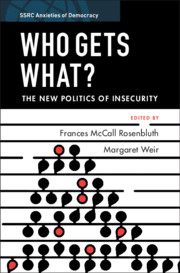
-
Select format
-
- Publisher:
- Cambridge University Press
- Publication date:
- 20 August 2021
- 29 July 2021
- ISBN:
- 9781108879170
- 9781108840200
- 9781108794138
- Dimensions:
- (228 x 152 mm)
- Weight & Pages:
- 0.68kg, 354 Pages
- Dimensions:
- (228 x 152 mm)
- Weight & Pages:
- 0.54kg, 354 Pages
You may already have access via personal or institutional login
Book description
The authors of this timely book, Who Gets What?, harness the expertise from across the social sciences to show how skyrocketing inequality and social dislocation are fracturing the stable political identities and alliances of the postwar era across advanced democracies. Drawing on extensive evidence from the United States and Europe, with a focus especially on the United States, the authors examine how economics and politics are closely entwined. Chapters demonstrate how the new divisions that separate people and places–and fragment political parties–hinder a fairer distribution of resources and opportunities. They show how employment, education, sex and gender, and race and ethnicity affect the way people experience and interpret inequality and economic anxieties. Populist politics have addressed these emerging insecurities by deepening social and political divisions, rather than promoting broad and inclusive policies.
Contents
Metrics
Altmetric attention score
Full text views
Full text views help Loading metrics...
Loading metrics...
* Views captured on Cambridge Core between #date#. This data will be updated every 24 hours.
Usage data cannot currently be displayed.
Accessibility standard: Unknown
Why this information is here
This section outlines the accessibility features of this content - including support for screen readers, full keyboard navigation and high-contrast display options. This may not be relevant for you.
Accessibility Information
Accessibility compliance for the PDF of this book is currently unknown and may be updated in the future.


